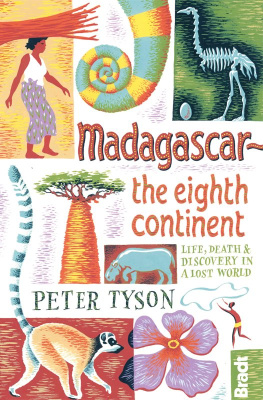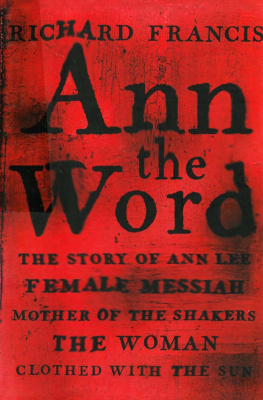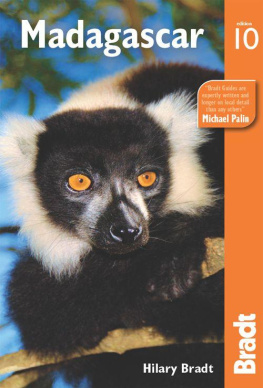THE EARTH SHAKERS OF MADAGASCAR
LONDON SCHOOL OF ECONOMICS MONOGRAPHS ON SOCIAL ANTHROPOLOGY
Managing Editor: Charles Stafford
The Monographs on Social Anthropology were established in 1940 and aim to publish results of modern anthropological research of primary interest to specialists.
The continuation of the series was made possible by a grant in aid from the Wenner-Gren Foundation for Anthropological Research, and more recently by a further grant from the Governors of the London School of Economics and Political Science. Income from sales is returned to a revolving fund to assist further publications.
The Monographs are under the direction of an Editorial Board associated with the Department of Anthropology of the London School of Economics and Political Science.
First published 2002 by Bloomsbury Academic
Published 2020 by Routledge
2 Park Square, Milton Park, Abingdon, Oxon OX14 4RN
605 Third Avenue, New York, NY 10017
Routledge is an imprint of the Taylor & Francis Group, an informa business
Oliver Woolley, 2002
All rights reserved. No part of this book may be reprinted or reproduced or utilised in any form or by any electronic, mechanical, or other means, now known or hereafter invented, including photocopying and recording, or in any information storage or retrieval system, without permission in writing from the publishers.
Notice:
Product or corporate names may be trademarks or registered trademarks, and are used only for identification and explanation without intent to infringe.
British Library Cataloguing-in-Publication Data
A catalogue record for this book is available from the British Library
ISBN 0-8264-5750-9 (hardback)
Library of Congress Cataloging-in-Publication Data
Woolley, Oliver, 1970-
The earth shakers of Madagascar: an anthropological study of authority,
fertility and creation/ Oliver Woolley.
p. cm. - (London School of Economics monographs on social anthropology ;
V. 73)
Includes bibliographical references and index.
ISBN 0-8264-5750-9
I. Sahafatra (Malagasy people)-Kings and rulers. 2. Sahafatra (Malagasy
people)-Rites and ceremonies. 3. Vondrozo (Madagascar)-Social life and
customs. I. Title. II. Series.
DT469.M277 S338
2002 305 .8993-dc21
2001042205
Typeset by Waverley Typesetters, Galashiels
ISBN 13: 978-0-8264-5750-9 (hbk)
The research on which this book is based was made possible by a postgraduate research studentship awarded by the Economic and Social Research Council and through affiliation with the Musee dArt et dArcheologie in Antananarivo. I am grateful to both institutions for their financial and academic assistance. I particularly thank Razafiarivony Michel for helping me to navigate through the necessary bureaucracy to obtain a long-stay visa, for always expressing an interest in my work and for inviting me to his home.
I amassed many debts before even departing for the field. I thank Peter Loizos for accepting me as an undergraduate at the London School of Economics in spite of mixed references; Rita Astuti and Maurice Bloch for welcoming me back and helping me fill out grant applications when I decided to do a PhD; Johnny Parry and Peter Loizos for having faith in me when I handed in a less than distinguished research proposal; Philip Thomas who gave me good advice pre-fieldwork; and Vola Hanta who set me on my way to learning Malagasy in her sitting room in Arsenal.
In Madagascar my debts are many. In the capital I would like to thank all those at the Musee dArt et dArcheologie, the ever-friendly staff at the Hotel Karthala and my valued friends Troels Mortensen and Wouter Laleman, with whom I shared great times and from whom I accepted wonderful hospitality. I also thank those at Akany Havozo (memorably dubbed the pig-huts by Maurice Bloch) who nursed me when I was ill, and all the other people who generously entertained us when we were in town.
In south-east Madagascar it is hard to know where to begin. In Farafangana I thank Yves and his family for endlessly helping me out with practical problems, feeding me, improving my Malagasy and enthusing about the coastal peoples. I thank Narcisse for pointing the way, and I thank those at the Tulipes Rouges and the Cocotiers for providing what was occasionally a much needed haven.
In Vondrozo I owe an unrepay able debt to the Ah Tang family who put us up, nurtured and spoilt us, fed us freshly made treats, lent us a houseful of belongings and gave us innumerable rides in their trucks. To Mademoiselle, Madame and the late Monsieur Ah Tang in particular I express my heartfelt thanks for acting as surrogate parents. I thank Frankie and Delia for their kindness, Bao and Christine for looking after us and Mena for uncomplainingly helping out with household duties. I pay special thanks to Gervais for tirelessly guiding us and to his wife, Solange, for always making an effort to include us and to explain everything. I also thank the Seng family, who took great interest in our welfare; Endrini Georgette, who rented us her house; and the staff at the Post Office, who delivered our mail.
My greatest debt of all is to the people of Sahafatra themselves, without whom I would have learnt nothing. Not only did they trust me and take me into their homes, they also took an active interest in what I was doing and went out of their way to humour me and answer my nonsensical questions. I will forever remain deeply moved by the generosity with which we were received and full of admiration for the proud and independent lives they lead. It is impossible to single out everyone who deserves thanks here so I list just a few of the many who contributed to this work and became our friends: the late Iabani Tahody and family; Iabani Zafitala and family; Tatahira, Pelamity and family; Iabani Mahavelo and family; Tsaninena; the Rangahy at Masim-boay and family; Iabani Nota and family; Iabani Fano; Iabani Kazafy and family; Iabani Fianar and family; the Kobatany at Miarinarivo; Iabani Ralay; Iabani Berlet
Extra-special thanks go to Fiona Wilson, who came when I needed her and stayed for a year without hesitating to count the cost.
Writing this book has not been easy. I thank all my fellow-students and teachers who have supported me over the years. In particular, I would like to thank my supervisors, Rita Astuti and Maurice Bloch, who, in their different styles, nursed me through my thesis, treated me as a person rather than a machine and had faith that it would all turn out all right. Thanks also to Karen Middleton for her encouragement and incisive viva critique and to Charles Stafford for his enthusiasm and the constructive comments he made while editing this book. My final thanks go to friends and family, who never ceased encouraging me, who refused to be rebuffed by my defensive answers to their questions and who carried on asking to the bitter end: So, hows it going?
The people of Madagascar all essentially speak one basic language, Malagasy. However, this language is by no means standardized throughout the island and many dialects are spoken. Malagasy is more of a linguistic ensemble (Verin 1975: 167) than a single language and different dialects display significant variations. Derived from Maayan of Borneo, Malagasy speech has been shaped over the course of more than a millennium through contact with other Indonesian and South Asian cultures and through engagement with Bantu, Arabic and European influences. Over this period, the language of the island itself has refracted into three broad bands: the Merina-Betsileo centre, the east and north coasts, and the west and south (Allen 1995: 121). The people living in the area under study, the land of Sahafatra in south-east Madagascar, think of themselves as speaking a dialect distinct from that found anywhere else on the island. Living as they do at the geographical and cultural crossroads of the three language bands, they incorporate elements of all of them, although the east-coast influence is most strongly felt. For political as much as linguistic reasons, the people of Sahafatra particularly contrast their own local way of speaking (









